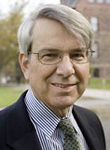Poetics should take priority, Culler asserts in SCT lecture
By Linda B. Glaser

Literary studies should focus on understanding the practices that enable works to have the meanings and effects they do, "rather than seeking to discover new and deeper meanings for the most highly valued works," Jonathan Culler asserted July 24 in the final lecture of the School of Criticism and Theory's public lecture series.
"Hermeneutics rules in literary studies, but poetics ought to take priority," declared Culler, the Class of 1916 Professor of English and Comparative Literature.
In his lecture, "The Language of the Lyric," Culler argued that a theory of the lyric is essential for pedagogical purposes, refuting the contention that such a theory is impossible because poems are tied to radically different cultural practices and social circumstances. "When we teach poems, if we do not give our students a model with which to approach them, they will approach them with whatever implicit model of the lyric they assimilated in secondary school -- or on some street corner," he said.
Culler's definitions of the lyric in his lecture bordered on poetry themselves, such as when he called lyric writing that "can be voiced, writing shaped to be heard," which relies on "the relations between sound, voicing and concepts of speakers and subjects."
While some scholars have defined the lyric as "fictional imitations of a recognizable speech act by a speaker-character," Culler contended that such poems are really special cases of dramatic monologue, and this definition should not be taken as a general model for the lyric. He offered the example of William Blake's "The Sick Rose" as an "event of poetic speech" rather than the voice of a particular speaker.
Indirection or "triangulated address," where a poet addresses the reader through language implicitly or explicitly addressed elsewhere, is an important component of the lyric, which John Stuart Mill said is overheard rather than heard. But Culler also stressed that in the triangle of poet, addressee and reader, the reader can also occupy the position of speaker, as he or she utters the words of the poem as well as receives them.
Poetry attempts to "be an event rather than a description of an event," Culler said. While a poem is not outside of time, neither is it located anywhere in particular in time, he said. Rather, it offers "a particularly rich sense of time, of the impossible nows in which we, reading, repeat these lyric structures. It contributes to the sense of lyric as event, not the fictional representation of an utterance nor … the projection of a fictional world."
He added that "lyric seems constructed for re-performance, potentially ritualistic, with an always iterable now."
Culler concluded by urging that a poetics of the lyric "should focus on ways in which linguistic elements, structures of address, and the present tense have effects other than those treated by conventional linguistic accounts," because exploration of these aspects of lyric are crucial to promote this threatened central strand of the literary tradition.
Linda B. Glaser is staff writer for the College of Arts and Sciences.
Media Contact
Get Cornell news delivered right to your inbox.
Subscribe